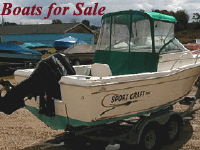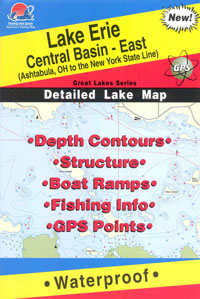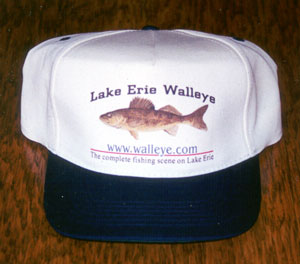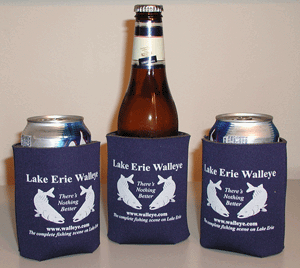|
Fish |
Outlook 2006 |
Basin “Hot spots” |
|
Walleye
 |
Anglers can expect this year’s Lake Erie
walleye fishery to be dominated by hatches from 1999, 2001 and
2003. Fish from the 1999-year class will range from 21 to 25
inches; fish from 2001 will range from 19 to 21 inches; and
those from 2003 will be 17 to 20 inches over the course of the
fishing season. Some large walleye from the strong hatches of
the 1980s and mid 1990s still persist in the population,
providing “Fish Ohio” trophy (more than 28 inches)
opportunities. The daily bag limit increases to four fish during
March and April for the 2006 fishing season and will remain at
six fish May through February. The 15-inch minimum size limit is
in effect during the entire season. Most of the fish from the
exceptionally abundant 2003 hatch will be of legal size during
the 2006 fishing season. |
West Sister Island, Northwest of North Bass
Island, East of Kelleys Island, Toledo Shipping Channel, Ruggles
Reef, Lorain, Cleveland, Euclid, Eastlake, Fairport, Geneva,
Ashtabula, Conneaut, Inshore early, Offshore late |
|
Yellow
Perch
 |
Perch anglers fishing the Ohio waters of Lake
Erie should also be pleased with this year’s catches. Fish from
a good 2001 hatch will range from 9-12 inches. Anglers should
expect to catch large numbers of perch from an exceptionally
strong hatch in 2003. Some “Fish Ohio” perch (more than 13
inches) will be available. Schools of these “jumbos” are not
abundant, but often can be in found in relatively shallow rocky
areas feeding on gobies and other prey fish. Ohio 's daily bag
limit for yellow perch increases to 40 fish per angler for the
2006 season. |
Central Basin fish are expected to run larger
than those in the Western Basin. Peak fishing will occur from
August through October, but early summer fishing should also be
rewarding, especially in the Central Basin. |
|
Smallmouth Bass
 |
Lake Erie anglers should anticipate good
smallmouth bass fishing this year. Fishing pressure tends to be
highest around the islands and nearshore areas of the western
half of Ohio waters. Smallmouth bass anglers can expect to land
"smallies" from 1993, 1994, 1998, 1999, and 2001-year classes,
now ranging in size from 14 to 19 inches and weighing 1.5 to 4
pounds. A closed season remains in effect from May 1 through
June 23, during which all black bass (smallmouth and largemouth)
must be immediately released. The daily bag limit after June 23
will remain at five fish with a 14-inch minimum length limit.
|
Traditional "hot spots" such as the Lake Erie
islands, the Western Basin reef complex, Sandusky Bay , Ruggles
Reef, and harbor breakwalls from Lorain to Conneaut, all
traditionally produce good numbers of smallmouth bass and the
potential to catch a trophy (more than 5 pounds). |
|
Steelhead
Trout
 |
Peak steelhead action on Lake Erie can be
found offshore from Vermilion to Conneaut, from June through
August, with catches measuring 17 to 29 inches. Most anglers
trolling for steelhead in deep waters use spoons with dipsy
divers or downriggers. Many charter guides now offer steelhead
charters as an alternative to traditional walleye charters. The
ODNR Division of Wildlife maintains this popular fishery by
releasing approximately 400,000 steelhead trout each spring in
the Vermilion, Rocky, Chagrin and Grand rivers, as well as
Conneaut Creek. |
Lake Erie steelhead move into Central Basin
streams during fall through winter and provide excellent fishing
opportunities for wading anglers throughout the fall, winter and
spring months. |
|
Panfish &
Largemouth Bass
 |
Because of the changing conditions of Lake
Erie, such as increases in water clarity and aquatic vegetation,
there are additional options for anglers. In early spring,
anglers may also catch an occasional northern pike or
muskellunge in these vegetated harbors. |
Many of the nearshore areas and harbors offer
excellent fishing for panfish, including crappie and bluegill,
as well as largemouth bass. |
Anglers are
reminded that fishing conditions on Lake Erie can change hourly and
adjustments are often necessary to improve their success. Anglers
should take into account such factors as water temperature, cloud
cover, water clarity, boat traffic, wave action, structure, and the
amount of bait fish in the area. Anglers are also reminded to
carefully monitor Lake Erie weather while fishing and to seek safe
harbor before storms approach.
During the
season, the Division of Wildlife provides an updated, recorded Lake
Erie fishing report at 1-888 HOOKFISH and
online. Division of Wildlife staff members are available from 8
a.m. to 5 p.m. weekdays at Fairport Harbor (440-352-4199) for
Central Basin information and at Sandusky (419-625-8062) for Western
Basin information. For additional information on lodging, charter
boat services, and local launch ramps, contact one of the following
lakeshore visitor’s bureaus.
Ashtabula County Convention & Visitors Bureau 800-337-6746
Lake County Visitors Bureau 800-368-5253
Convention & Visitors Bureau of Greater Cleveland 800-321-1001
Lorain County Visitors Bureau 800-334-1673
Sandusky/Erie County Visitors Bureau 800-255-8070
Ottawa County Visitors Bureau 800-441-1271
Greater Toledo Convention & Visitors Bureau 800-243-4667
Ohio Division of Travel & Tourism 800-BUCKEYE
The Division
of Wildlife maintains a series of web pages describing its Lake Erie
research and management programs, fisheries resources, open lake and
steelhead fishing reports, as well as maps and links to other Lake
Erie web resources. This information is available at:
www.ohiodnr.com/wildlife/fishing/fairport/index.htm.
Reprinted, courtesy of Ohio DNR. |









